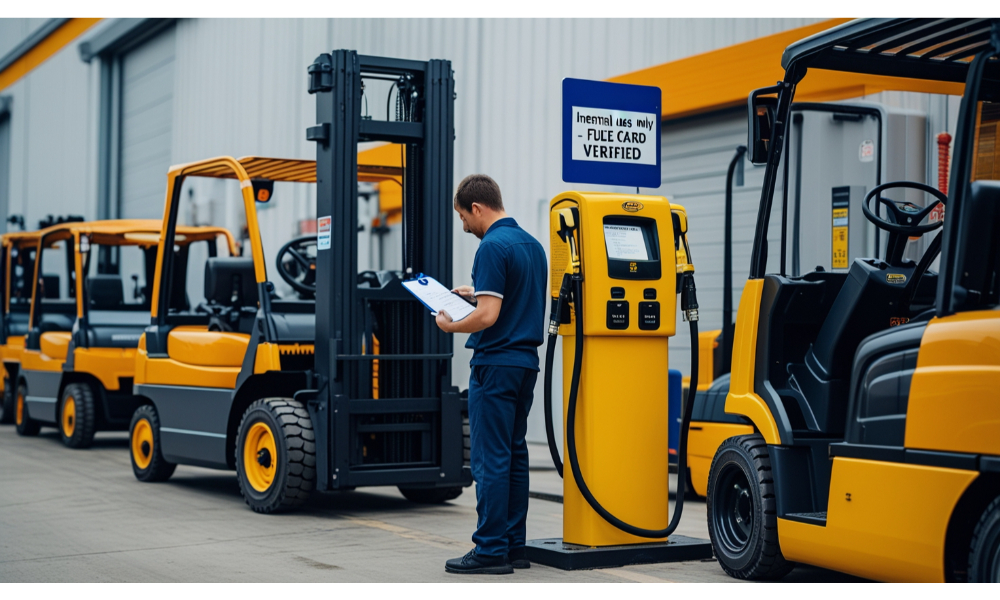Fuel Cards: The Ideal Solution for Growing Fleets and Increased Efficiency

Managing a growing fleet can feel like trying to juggle while riding a unicycle, challenging and a bit overwhelming. With fuel costs constantly fluctuating and the need for accountability looming large, fleet managers are often left searching for effective solutions that not only save money but also simplify their operations. Enter fuel cards: the shining knights in the world of fleet management. These cards not only offer savings and better tracking but also bring peace of mind by ensuring security against potential fraud. In this article, we’ll dive into the advantages of fuel cards, exploring how they can transform your fleet’s efficiency and help you stay on top of expenses, all without requiring you to sacrifice valuable time or resources.
Fuel cards are ideal for growing fleets because they provide significant savings on fuel costs and streamline payment processes, allowing fleet managers to efficiently track expenses. They also enhance security through customizable controls and real-time reporting, which is crucial as fleets scale in size and complexity.
Advantages of Fuel Cards for Fleet Companies
One of the standout benefits of using fuel cards is the level of real-time reporting they provide. Fleet managers can track fuel usage down to the penny, gaining insights that allow them to understand exactly where their money is going. Imagine being able to pinpoint fluctuations in fuel spending across different vehicles or routes; this data empowers managers to make informed decisions about operations and budgeting.
Even more exciting is the customizable nature of these reports. Fleet cards often allow operators to tailor reports based on specific criteria such as fuel type, date, or even driver behavior. This feature enhances accountability and motivates drivers to be more mindful about fuel consumption, ultimately leading to safer driving habits. When drivers know they are being monitored, it can lead to impressive decreases in harsh braking or unnecessary idling.
Equip your fleet with tools that control expenses while encouraging driver performance improvements.
Additionally, fuel cards streamline not just the purchasing process but also the administrative side of managing . With traditional payment methods, records and receipts pile up quickly, leading to tedious paperwork and costly errors. However, by implementing a fuel card system, all transactions are automatically tracked and recorded digitally. This eliminates clutter and significantly reduces administrative costs associated with misplaced invoices or manual entry errors.
Based on the studies of CITGO, the time saved per transaction can be around 5-10 minutes compared to traditional payment methods,a small step that contributes positively towards overall efficiency.
Moreover, many fuel cards come equipped with security features designed to protect against fraud. These may include customizable transaction limits and alerts for unusual spending patterns. For fleet managers, this sense of security is indispensable; it means that you can confidently manage a fleet without constant worry about unauthorized purchases or misuse of funds.
A fleet supervisor at a regional trucking company remarked, “With our new fuel card system, we’ve seen a significant drop in fraudulent activity,an assurance I never knew I needed until now.”
The peace of mind provided by enhanced security measures supports overall operational integrity.
As companies reposition themselves in a market that increasingly favors digital transactions, fuel cards also represent a move toward modernization. The growing trend towards e-payments means that adopting fuel cards not only prepares your fleet for today but also positions it favorably for future developments in technology.
These advancements in payment processing mirror broader changes happening in the industry, paving the way for further savings and efficiencies ahead.
Financial Savings and Rebates
One of the most attractive facets of fuel cards is their ability to offer financial savings through structured rebates and discounts. Businesses that manage fleets can benefit significantly from these incentives. For instance, according to data from , discounts can range dramatically based on fuel consumption volumes. A fleet purchasing between 300 and 499 gallons monthly might see a rebate of 1¢ per gallon, while buying over 50,000 gallons could yield an impressive 8¢ discount per gallon. The sheer difference in savings highlights why closely managing fuel consumption is a paramount focus for any fleet manager.
If we put this in perspective: Imagine a fleet utilizing 50,000 gallons every month. This marks a substantial annual expense; yet, with the rebates offered through fuel cards, a business could save approximately $4,000 each year just from rebates alone. That’s not trivial money, it’s the equivalent of adding additional resources to your operation or funding necessary repairs to help keep the fleet running smoothly.
Beyond monetary rebates accrued through regular use, fuel cards also provide an edge against fluctuating fuel prices. These pricing structures often lock in favorable rates at partnered fueling stations, which protects businesses from sudden market shifts.
Operational Efficiency Gains
The benefits don’t stop at mere discounts; leveraging fuel cards extends into operational efficiency gains as well. For example, take the Shell US Card. It doesn’t just offer competitive gas prices, this card combines savings across various sectors such as tire purchases, maintenance services, and even wireless plans. This bundling effect illustrates how a single fuel card can streamline multiple facets of fleet management, ultimately contributing to broader fiscal efficiency.
By focusing on operational efficiency alongside financial savings, businesses can blend short-term and long-term strategies that enhance profitability while maintaining streamlined processes. Thus, investing in fuel cards becomes not merely about saving at the pump but part of an overarching approach to optimized fleet management that fosters sustainability and growth.
A closer examination of these tools reveals how they facilitate better management practices, paving the way for transformational changes within organizations.
Efficient Fleet Management with Fuel Cards
Fuel cards contribute significantly to efficient fleet management by seamlessly integrating fuel purchasing information with a company’s overall accounting systems. This integration saves time and reduces errors caused by manual entry, allowing for real-time monitoring of fuel expenses. Fleet managers have the invaluable ability to access comprehensive data on fuel usage, which enables them to analyze performance holistically across the fleet.
Real-time reporting is critical because it provides fleet managers with immediate insights into their fuel consumption. They can track how much fuel each vehicle is using and detect patterns that might indicate inefficiencies or potential fraud. For instance, if one vehicle suddenly begins consuming more fuel than its peers, it may suggest maintenance issues or even unauthorized use.
One effective strategy for maintaining oversight of these trends is implementing automated alerts for suspicious purchasing activities. By setting thresholds for fuel purchases based on historical data, fleet managers receive notifications whenever spending exceeds those limits. This proactive measure allows companies to quickly address any irregularities before they escalate into significant financial losses.
As we explore the benefits of using fuel cards, better access to data translates directly into improved operational efficiency across the board.
Fuel cards also simplify administrative tasks associated with managing vehicle fleets. Gone are the days when employees had to keep track of receipts and manually report their fuel purchases. Instead, with a dedicated fuel card solution, all transactions are automatically recorded and categorized in real-time, making account reconciliation effortless. This convenience frees up valuable time for fleet managers who can focus on strategic planning and other critical aspects of their operations.
Furthermore, the analytical features found within many fuel card platforms allow managers to run customized reports to track metrics such as fuel economy per vehicle or average cost per mile. This data can be instrumental in assessing driver behavior and optimizing routes for greater efficiency. By identifying drivers who consistently exhibit poor fuel efficiency, companies can implement targeted training programs that encourage more responsible driving practices.
As Manpreet Rana aptly puts it: “With a heightened focus on reducing TCO…real-time data helps ensure proper maintenance, minimizing expensive repairs.” This approach resonates well in a market where cost efficiency is paramount.
Beyond capturing spending patterns and simplifying record-keeping, utilizing fuel cards also aligns with broader strategic initiatives toward sustainability and cost control.
Many companies increasingly recognize that by adopting modern technologies like fuel cards, they are contributing positively to their sustainability goals too. These tools facilitate monitoring carbon emissions linked to fuel consumption, enabling fleets to make informed decisions regarding alternative fuel options and greener vehicle choices. With over 60% of fleets exploring hybrid or alternative vehicles rather than strictly focusing on electric options, fuel cards provide vital support in transitioning toward these initiatives effectively.
Collectively, these advantages illustrate that leveraging fuel cards enhances day-to-day operational efficiency while strengthening a company’s long-term sustainability endeavors along with financial resilience – crucial factors amid the challenges faced by today’s fleet management industry.
In this landscape of strategic advancements in fleet management, understanding spending behaviors becomes increasingly essential for maximizing resources effectively. Let’s turn now to examine techniques that can enhance fiscal oversight and budget adherence.
Spending Control and Budgeting
One of the critical aspects of managing growing fleets is maintaining control over fuel expenses and sticking to budgets. With rising fuel costs, this task can feel daunting, but fuel cards simplify the process significantly. By leveraging fuel card technology, fleet managers gain the ability to efficiently track fuel transactions and manage spending patterns across all drivers in real-time.
Enforcing Spending Limits
One of the most powerful features of fuel cards is the ability to set personalized spending limits on each card issued to drivers. This means that instead of worrying about unexpected spikes in fuel costs or unauthorized purchases, fleet managers can define what each driver can spend. For instance, EFS Fleet Cards allow for individualized limits on both fuel and non-fuel purchases. Such controls create an additional layer of security that tightens budgetary constraints while empowering drivers to make responsible fueling decisions without micromanagement.
Furthermore, limiting spending reduces opportunities for misuse or fraud. With detailed tracking capabilities, any discrepancies can be identified easily, ensuring accountability throughout the fleet. Proactive management protects the bottom line and fosters a culture of responsibility among employees.
Better Budget Planning
Accurate data from fuel cards enhances budgeting accuracy. Detailed transaction reports generated through these cards provide valuable insights into fuel usage trends, enabling fleet managers to forecast expenses more reliably. This eliminates guesswork by presenting a clear picture of how much fuel each vehicle consumes, identifying peak usage times, and revealing potential areas for cost-cutting.
When budgets are based on actual performance metrics rather than estimates or assumptions, companies are prepared for immediate needs and future challenges or expansions. Established budgets on solid foundations allow scaling effectively without jeopardizing financial health.
While control over expenses is vital, fostering a streamlined experience for drivers plays an equally important role in successful fleet operations.





